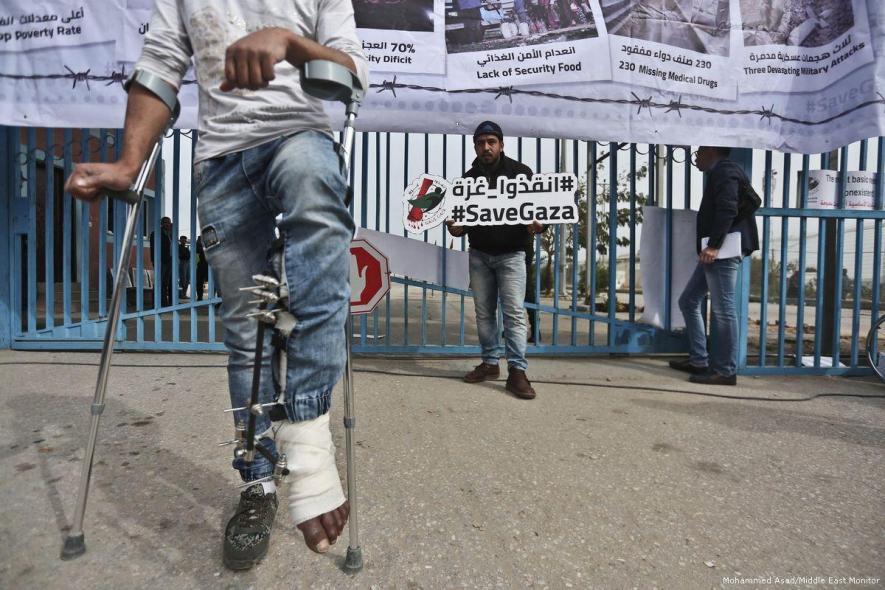India’s Disability Movement Must Stand with Palestine

Image Credit: Peoples Dispatch
Every year, the month of July is celebrated globally as Disability Pride Month, as the Americans With Disabilities Act of 1990 was passed on July 26, 1990. One may contest the imposition of this ‘pride’ over the disabled of the Global South who face a precarious situation due to imperialist wars, settler colonialism, and neo-liberal economic policies. However, this question may not be legible on the surface as the neoliberal disability discourse itself attempts to conceal these questions.
This year, the pride month came when the war in Gaza was still going on, and that has resulted in the death and disablement of several Palestinians. The war is still going on. The question of disability pride and neo-liberal empowerment became acutely political in the context of settler colonialism and its imperial war, though we may continue to pretend to be apolitical.
The war in Gaza has given rise to various innovative ways of protest, and one among them is teach-in protests against war and settler colonialism. These resistance teach-ins that attempt to valorise the readings on decolonisation epistemically and are attempting to highlight the adverse impact of settler colonialism on Palestinians have Jasbir Puar’s , The Right to Maim, as one of the essential readings.
Puar’s scholarly intervention must catch the attention of every stakeholder of the disability movement in India, as it disrupts some for-granted assumptions of our contemporary disability discourse. She highlights the point that settler colonialism, its occupation, and war machines produce mass ‘debilitation,’ an ‘expected impairment’ and ‘slow death’ of Palestinian people as a normal consequence of imperialism, its governmentality, and wars.
The Israeli Occupation of Gaza exercises its sovereign entitlement over Palestinian bodies. Such debilitated bodies may not have the ‘privilege’ of being acknowledged and access to resources as disabled. The debilitation caused by the colonial war machine, occupation, and US imperialism, Puar argues, disrupts the narrative of neoliberal disability rights framework, pride, and empowerment narrative. Empowering and giving grudging admission to a few privileged disabled in a neo-liberal economy while debilitating others must be resisted by the disabled as a group at domestic and global levels.
Disability groups in the democratic world are acutely aware of this. Disability Divest is one such group of disabled individuals in the US who are demanding that the US ‘disability establishment’ must end its relationship with war profiteers and complicity with genocide and colonialism. By taking this position against the war in Gaza, conscientious disabled citizens of the US did not allow the appropriation of themselves by the US establishment.
Historian Douglas Baynton has highlighted the fact that disability as a category has been used to justify the inequality and oppression of other minority groups. Scholars David Mitchell and Sharon Snyder point out that the US establishment promotes an image of ‘American exceptionalism’ of a caring state on behalf of ‘displaced, marginalised and differentially embodied.’ These images are then imported to justify the US’ imperial policies and war.
Israel’s Prime Minister Benjamin Netanyahu’s speech in US Congress and his dog-whistling against LGBTQ+ people’s support for Palestine as ‘Chickens for KFC’ tells us how imperial powers and settler colonialists are using their ‘care’ for queer and disabled communities for pinkwashing their wars, justifying their settler colonialism while simultaneously demonising the Palestinians.
Sadly, in India, the disability groups are mostly silent on the question of settler colonialism and war in Gaza. Apart from the National Platform for the Rights of Disabled Persons (NPRD) and Revival Disability India, most mainstream disability organisations in India have remained silent on this issue.
The continuous debilitation of Palestinians should have been a profound political and human rights issue for India’s disability movement, yet it received scant attention. This attitude is in tandem with the nature of most disability NGOs. The primary agenda has remained middle-class concessions to a few visible and privileged disabled in the neo-liberal economy, as feminist disability scholar Anita Ghai points out.
This silence becomes more voluminous when the disability movement as a collective does not speak against the debilitation of other minority groups at the domestic level. At the same time, the establishment gets to patronise the disabled as ‘divyang.’
Critical disability studies scholars have pointed out that States are the sites of hegemonic masculinities that control and patrol the bodily autonomy of the disabled, especially disabled women. These hegemonic masculinities, anxieties, and violence often result in violence over disabled bodies and mass debilitation of the ‘disposal bodies’ of the colonised.
Therefore, the question of war profiteering and settler colonialism must be treated as a question that is of profound interest to disability discourse. Standing in solidarity with the victims of settler colonialism and exclusionary politics should be treated as one of the core agendas of disability movement in India to be on the right side of the history.
The writer is an Assistant Professor (Law) at The West Bengal National University of Juridical Sciences and a person with disability. He is also the Director of Justice Radhabinod Pal Centre of Critical Legal Studies. The views are personal.
Get the latest reports & analysis with people's perspective on Protests, movements & deep analytical videos, discussions of the current affairs in your Telegram app. Subscribe to NewsClick's Telegram channel & get Real-Time updates on stories, as they get published on our website.
























